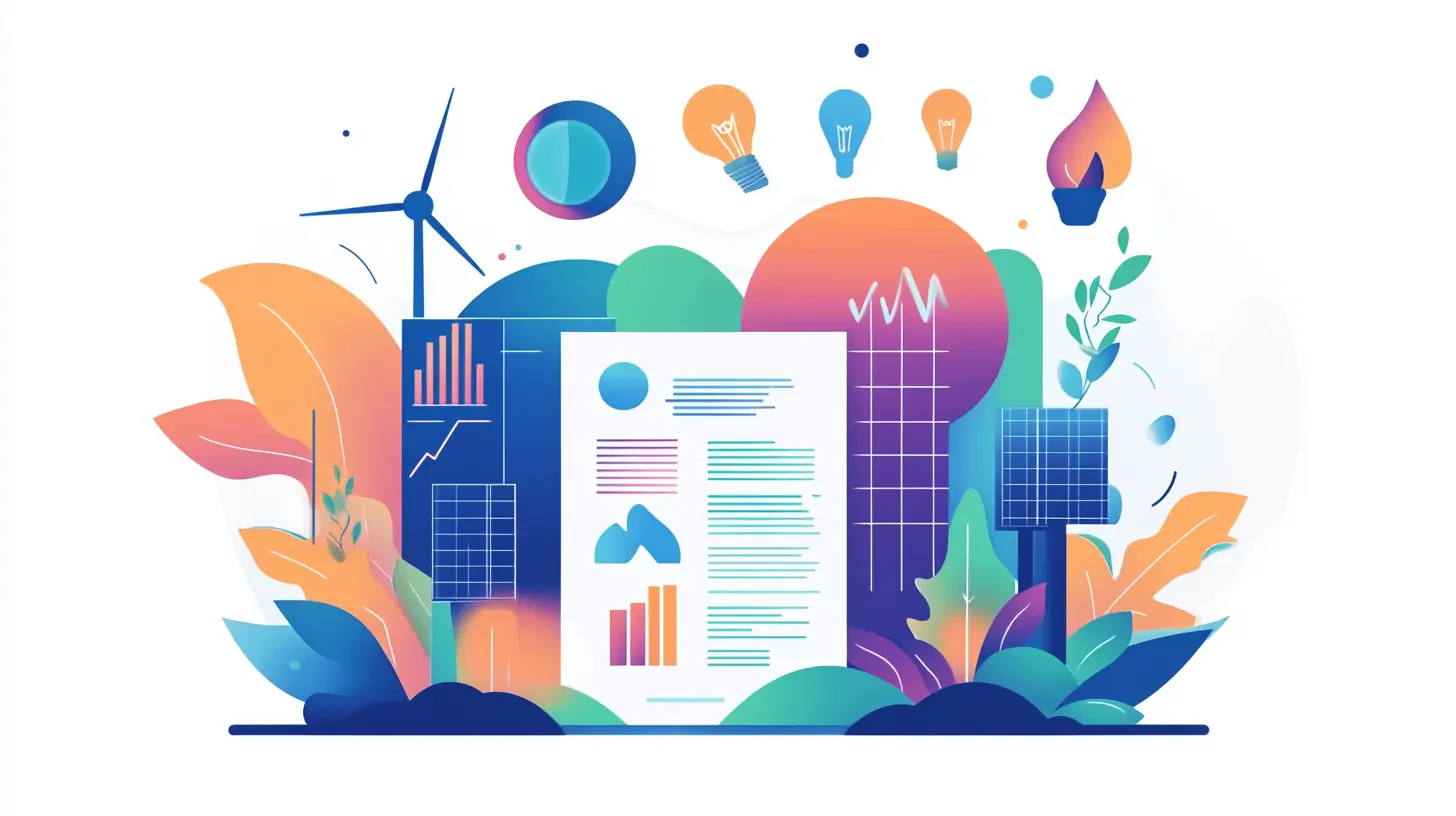What is a Sustainability Report? A Quick Guide to Understanding Organizational Sustainability

What is a Sustainability Report?
A Sustainability Report is a document prepared by an organization to disclose its economic, social, and environmental operations. Its primary goal is to communicate the organization’s performance and impact comprehensively to its stakeholders.This report plays a crucial role in showcasing both the positive and negative impacts of the organization on society and the environment—information that cannot be fully conveyed through financial reports alone. Examples of positive impacts include job creation and quality of life improvements, while negative impacts might involve the consumption of natural resources and pollution.
Preparing a Sustainability Report helps align the organization’s strategies with its sustainability initiatives, enabling a clearer identification of business risks and opportunities. Additionally, it fosters transparency and builds trust, as the organization reveals its true performance, including both successes and challenges.
The preparation of such reports should adhere to principles of factual accuracy, avoiding any manipulation or selective disclosure of information. This ensures the organization’s credibility and enhances its reputation.
Key Components of a Sustainability Report (or SD Report)
An effective sustainability report comprises several key elements, focusing on delivering comprehensive information about environmental, social, and governance (ESG) aspects.
Setting ESG GoalsDefining ESG goals is a critical starting point for preparing a sustainability report. Organizations should identify clear, measurable, and business-aligned objectives. Examples include:
- Environmental: Reducing greenhouse gas emissions, adopting renewable energy, or minimizing waste generation.
- Social: Enhancing workforce skills, promoting diversity and inclusion, or supporting local communities.
- Governance: Combating corruption, implementing risk management, or ensuring transparency in business operations.
A robust sustainability report should address the following areas:
- Environmental Impact: Resource usage, pollution emissions, and measures to mitigate impacts.
- Community Development: Corporate social responsibility projects, local job creation, and quality-of-life improvements.
- Corporate Governance: Organizational structure, ethical policies, and risk management practices.
- Economic Performance: Financial results, economic value creation, and income distribution to stakeholders.
Preparing reports according to international standards enhances credibility and comparability. Popular reporting frameworks include:
- GRI (Global Reporting Initiative): A widely recognized standard that categorizes reporting into ESG topics and provides clear indicators.
- SASB (Sustainability Accounting Standards Board): Focuses on reporting financially material sustainability data, with industry-specific standards.
Organizations should also consider aligning their operations with the United Nations' Sustainable Development Goals (SDGs) to demonstrate contributions to addressing global challenges.
Importance of a High-Quality Sustainability ReportDeveloping a quality sustainability report goes beyond mere disclosure. It serves as a vital tool to drive sustainable development within an organization. This includes identifying risks and business opportunities, refining strategies, and creating long-term value.
Connection to SET ESG Ratings and FTSE Russell ESG Scores
SET ESG Ratings evaluate the sustainability performance of companies listed on the Stock Exchange of Thailand, focusing on three key dimensions: environmental, social, and governance (ESG). This assessment plays a crucial role in encouraging listed companies to operate sustainably by considering their environmental impact, social responsibility, and good corporate governance.
The Stock Exchange of Thailand is enhancing its sustainability assessment standards by transitioning from SET ESG Ratings to FTSE Russell ESG Scores, a global standard that evaluates over 8,000 companies across 47 countries. This shift aims to improve credibility, attract global investors, and enable Thai companies to benchmark their ESG performance against leading global firms effectively.
FTSE Russell ESG Scores emphasize assessments based on publicly disclosed information, aligning with global evaluation practices. This approach enhances the transparency of evaluations, reduces the burden of filling out assessment forms for listed companies, and helps align their ESG efforts with international standards.
Importance of Sustainability Reports
Sustainability reports are vital for improving rankings and competitiveness in the market, as they serve as:
- A Key Source for ESG Assessments: Information disclosed in sustainability reports is used to evaluate both SET ESG Ratings and FTSE Russell ESG Scores.
- A Tool to Build Credibility: Companies that provide comprehensive and transparent ESG reporting often gain more trust from investors and stakeholders.
- An Attraction for Sustainability-Focused Investors: Global investors increasingly prioritize sustainable investments, making sustainability reports an essential tool for attracting this group.
- A Competitive Advantage: Companies with strong ESG performance are often better positioned for growth and long-term returns.
Producing high-quality sustainability reports not only improves ESG rankings but also serves as a crucial communication tool for engaging stakeholders, enhancing sustainability initiatives, and strengthening competitiveness in both domestic and international capital markets.
Benefits of a Sustainability Report for Organizations
Preparing a Sustainability Report (or SD Report) offers numerous advantages for organizations:1. Enhances Confidence Among Investors and Stakeholders
- Provides a clear picture of the organization's economic, social, and environmental impacts.
- Helps identify opportunities and risks associated with the organization's activities.
- Strengthens organizational credibility by demonstrating transparency and accountability.
- Attracts investors who prioritize sustainable investments.
- Builds trust and enhances the organization's reputation within the community.
- Encourages engagement among current employees and attracts new talent who value sustainability.
- Transparently communicates the organization's achievements and challenges.
- Demonstrates continuous and sustainable business development.
- Helps organizations understand concrete pathways toward a sustainable future.
- Enables better identification and management of ESG-related risks.
- Prepares the organization to comply with increasingly stringent ESG regulations and standards.
- Promotes innovation and the creation of improved operational strategies.
- Measures impacts arising from business activities.
- Understands the connection between business objectives and ESG impacts.
- Informs organizational planning based on data derived from the report.
- Provides a competitive advantage in the marketplace.
Creating a Sustainability Report is not just about disclosing information; it is a critical management tool for fostering long-term sustainability. It helps organizations adapt and evolve operations to align with societal expectations and shifting regulations.
How to Begin Preparing a Sustainability Report
Starting to prepare a Sustainability Report (SD Report) requires careful planning and collaboration among various departments within an organization. Below are the steps to guide the process:1. Initial Steps
- Internal Preparation: Establish a working group comprising representatives from various departments to ensure all perspectives are considered.
- Data Collection: Gather relevant information about the organization’s Environmental, Social, and Governance (ESG) activities, covering all aspects of environment, society, and corporate governance.
- Report Drafting: Begin by defining the report structure, potentially referencing international reporting standards like the GRI Standards.
- Define ESG Goals: Set clear, measurable, and business-aligned ESG targets.
- Stakeholder Engagement: Identify and communicate with internal and external stakeholders to understand their expectations and key concerns.
- Internal Communication: Build awareness and foster engagement among employees at all levels regarding sustainability efforts.
- ESG Consultants: Consider hiring consultants with expertise in sustainability reporting, especially for organizations just starting out.
- Digital Tools: Use software or platforms designed to assist with data collection, analysis, and ESG reporting.
- International Guidelines and Standards: Follow recognized reporting frameworks such as the GRI Standards or SASB to ensure credibility and comparability of the report.
- Guides and Best Practices: Leverage sustainability reporting guides provided by relevant bodies, such as the Stock Exchange of Thailand.
Starting a Sustainability Report can be challenging but is a vital step in driving an organization toward sustainability. Treat it as a continuous learning and improvement process, aiming to enhance the quality of reporting and ESG performance each year.
Summary of Guidelines and Plans for Sustainability
A sustainability report is a crucial tool that enables organizations to communicate their sustainability performance comprehensively and transparently. Producing a high-quality report not only enhances organizational credibility but also serves as a key mechanism for driving sustainable development.Reporting in accordance with international standards such as GRI (Global Reporting Initiative) or SASB (Sustainability Accounting Standards Board) ensures that information is reliable and globally comparable. Moreover, aligning operations with the United Nations' Sustainable Development Goals (SDGs) demonstrates active engagement in addressing global challenges.
Creating a sustainability report is more than merely disclosing information; it is a process that helps organizations identify business risks and opportunities, refine strategies, and create long-term value. Additionally, it prepares organizations for increasingly stringent ESG (Environmental, Social, and Governance) regulations in the future.
For organizations just beginning this journey, preparing a sustainability report can be challenging. However, starting with clear goal-setting, gathering relevant data, and maintaining ongoing communication with stakeholders can ease the process. Leveraging digital tools and expert guidance can further improve efficiency and effectiveness.
Ultimately, a sustainability report is not just a document crafted to meet stakeholder expectations. It is a vital instrument for driving internal transformation toward more responsible and sustainable business practices. This shift benefits the organization, society, and the environment in the long term.
About Optiwise
Optiwise offers Investor Relations & ESG consulting services, corporate website design, and IR website development. We also provide advisory services for initial public offerings (IPOs) and the preparation of essential documents for public companies. Additionally, our public relations efforts aim to build credibility and enhance the corporate image.
For more information about Optiwise's services, please contact us here.


